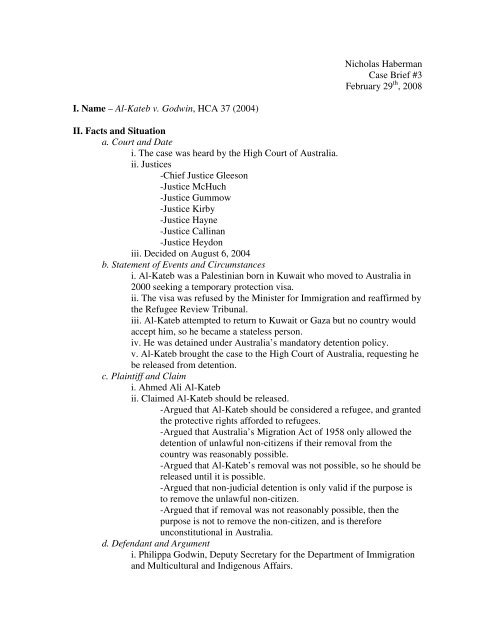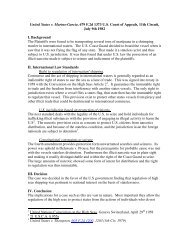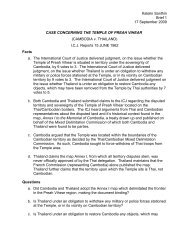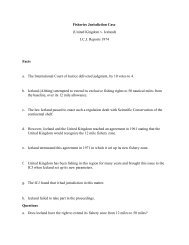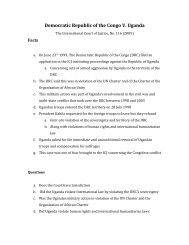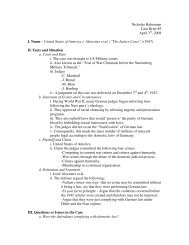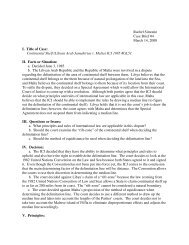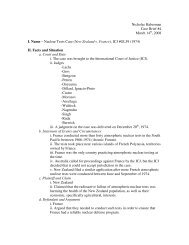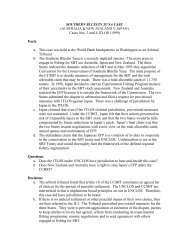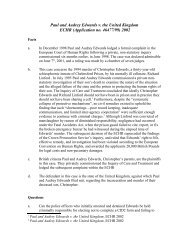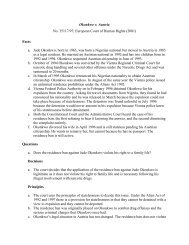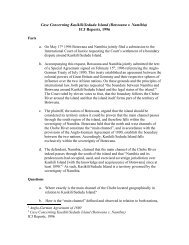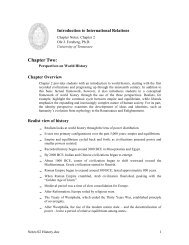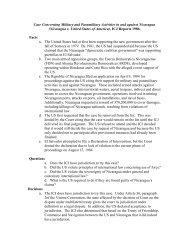Al-Kateb v. Godwin, HCA 37 (2004) - Courses
Al-Kateb v. Godwin, HCA 37 (2004) - Courses
Al-Kateb v. Godwin, HCA 37 (2004) - Courses
You also want an ePaper? Increase the reach of your titles
YUMPU automatically turns print PDFs into web optimized ePapers that Google loves.
Nicholas HabermanCase Brief #3February 29 th , 2008I. Name – <strong>Al</strong>-<strong>Kateb</strong> v. <strong>Godwin</strong>, <strong>HCA</strong> <strong>37</strong> (<strong>2004</strong>)II. Facts and Situationa. Court and Datei. The case was heard by the High Court of Australia.ii. Justices-Chief Justice Gleeson-Justice McHuch-Justice Gummow-Justice Kirby-Justice Hayne-Justice Callinan-Justice Heydoniii. Decided on August 6, <strong>2004</strong>b. Statement of Events and Circumstancesi. <strong>Al</strong>-<strong>Kateb</strong> was a Palestinian born in Kuwait who moved to Australia in2000 seeking a temporary protection visa.ii. The visa was refused by the Minister for Immigration and reaffirmed bythe Refugee Review Tribunal.iii. <strong>Al</strong>-<strong>Kateb</strong> attempted to return to Kuwait or Gaza but no country wouldaccept him, so he became a stateless person.iv. He was detained under Australia’s mandatory detention policy.v. <strong>Al</strong>-<strong>Kateb</strong> brought the case to the High Court of Australia, requesting hebe released from detention.c. Plaintiff and Claimi. Ahmed <strong>Al</strong>i <strong>Al</strong>-<strong>Kateb</strong>ii. Claimed <strong>Al</strong>-<strong>Kateb</strong> should be released.-Argued that <strong>Al</strong>-<strong>Kateb</strong> should be considered a refugee, and grantedthe protective rights afforded to refugees.-Argued that Australia’s Migration Act of 1958 only allowed thedetention of unlawful non-citizens if their removal from thecountry was reasonably possible.-Argued that <strong>Al</strong>-<strong>Kateb</strong>’s removal was not possible, so he should bereleased until it is possible.-Argued that non-judicial detention is only valid if the purpose isto remove the unlawful non-citizen.-Argued that if removal was not reasonably possible, then thepurpose is not to remove the non-citizen, and is thereforeunconstitutional in Australia.d. Defendant and Argumenti. Philippa <strong>Godwin</strong>, Deputy Secretary for the Department of Immigrationand Multicultural and Indigenous Affairs.
ii. Defend that it is lawful to indefinitely detain <strong>Al</strong>-<strong>Kateb</strong>.-Argued that <strong>Al</strong>-<strong>Kateb</strong> was a stateless person, not a refugee, andtherefore not afforded the rights granted to refugees.-Argued that <strong>Al</strong>-<strong>Kateb</strong> was legally detained under Australia’smandatory detention policy because the plaintiff did not have avalid visa or passport.-Argued that just because the removal of the plaintiff is not in theforeseeable future, it does not change to policy of the MigrationAct to detain unlawful non-citizens during the process of the law.-Argued that detention was not exclusive to the judicial branch,and therefore did not violate the constitution of Australia.III. Questions and Issues in the Casea. International Lawi. Is <strong>Al</strong>-<strong>Kateb</strong> a refugee or a stateless person?b. Relevant Questionsi. Can <strong>Al</strong>-<strong>Kateb</strong> be detained indefinitely according to Australia’sMigration Act of 1958?ii. Can unlawful non-citizens be detained without being charged with acrime?iii. Is <strong>Al</strong>-<strong>Kateb</strong>’s detention in violation of the Australian Constitution?c. Primary Questioni. Is it lawful to indefinitely detain a stateless person?IV. Decision and Court’s Reasoninga. Is <strong>Al</strong>-<strong>Kateb</strong> a refugee or a stateless person?i. <strong>Al</strong>-<strong>Kateb</strong> does not meet the definitions of a refugee according to the1951 Refugee Convention.ii. The plaintiff could not claim nationality in any State, and therefore is astateless person.b. Can <strong>Al</strong>-<strong>Kateb</strong> be detained indefinitely according to Australia’s Migration Act?i. Yes, the Migration Act permits the indefinite detention of <strong>Al</strong>-<strong>Kateb</strong>.ii. Found that “even if, as in this case, it is found that ‘there is no reallikelihood or prospect of the non-citizen’s removal in the reasonablyforeseeable future’, that does not mean that continued detention is not forthe purpose of subsequent removal.”c. Can unlawful non-citizens be detained without being charged with a crime?i. Yes, the mandatory detention policy may be applied because <strong>Al</strong>-<strong>Kateb</strong>did not have a visa, and is required to be detained according to Australianlaw.d. Is <strong>Al</strong>-<strong>Kateb</strong>’s detention in violation of the Australian Constitution?i. No, the plaintiff’s detention was not based on punitive punishment.ii. Therefore, it is irrelevant which branch was responsible for hisdetention.e. Is it lawful to indefinitely detain a stateless person?
i. Yes, it is lawful to indefinitely detain a stateless person because it was afunction of the Migration Act.ii. Yes, because the detention of <strong>Al</strong>-<strong>Kateb</strong> did not violate chapter III of theAustralian constitution.V. Principlesa. International Law Pointsi. The necessary qualifications to claim refugee status.ii. The dilemma stateless persons on International Law.b. Most Important Rule in Casei. Stateless persons do not claim nationality in any State, and thereforeare subject to the laws of the nation in which they are currentlypresent without the diplomatic assistance of a representative State.c. General Rules Illustrated by Decisioni. <strong>Al</strong>l people entering a foreign nation are subject to the State’s federalpolicies concerning immigration.ii. The constitutional law of a State is subject to the evolution of itsinterpretation.iii. The United Nations do not clearly specify the rights of statelesspersons in comparison with refugees.VI. Conclusiona. Analysis and Notesi. <strong>Al</strong>-<strong>Kateb</strong> was a stateless person and was subject to the mandatorydetention policy of Australia.ii. A person may be imprisoned in a foreign country without committing acrime if they fail to prove nationality to a State.iii. It is not a good to be a stateless person, because there is no expectationfor aid or representation.VII. Bibliography<strong>Al</strong>-<strong>Kateb</strong> v. <strong>Godwin</strong>, <strong>HCA</strong> <strong>37</strong>, High Court of Australia (<strong>2004</strong>).Slomanson, William R., Fundamental Perspectives on International Law, 5th edn.,California, Thomson-Wadsworth Pub., 2007.


